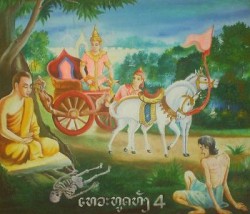A Quantum Theory of Dharmas
F rom our Archives: an article by Kyogen Carlson
rom our Archives: an article by Kyogen Carlson
Based on a Dharma Talk Kyogen gave at Dharma Rain Zen Center August 15, 2010 and published in Still Point May 2011.
I had a conversation with a sangha member a few years ago. He said he had been looking at his life, at all his difficulties and disappointments, when he realized that it really wasn’t all that bad. Then the question arose, “What am I complaining about?” That can sound dismissive, like “oh, grow up and get over it,” but that’s not what this was about. To start with, he had quite a deep realization that things really were OK, and yet the complaint was there. His question was quite real. What am I complaining about? From this conversation, I recognized something about seeking and path. The way-seeking mind is born from precisely this condition. We seek because this question, this dilemma, is fundamental to our experience.
Before going more deeply into this question, we first need to look at some basic Buddhism. The First Noble Truth is “all dharmas are marked by dukkha.” This carefully crafted and quite technical observation is often translated as “life is suffering.” Anyone who has been around the Zen Center very long knows I really dislike that translation. There are commentaries and expansions on the First Noble Truth that say pretty much just that, but the original observation is much more subtle. Small “d” dharmas are anything that arises and falls, that has a cause, lasts for a period of time, then passes away. Thoughts, feelings, and even objects like chairs and mountains can be understood as dharmas. A “mark” is a quality inherent in something. So, all dharmas are “marked” by “dukkha.” While dukkha can mean “suffering,” it has other meanings as well, and in this formula it means something much more subtle. One translation is “all dharmas are marked by unsatisfactoriness.” While clumsy, this hits the mark.
 There is a very old Buddhist parable about a man and a chair. Let’s say he is quite large, with an unusually long torso and rather short legs. Most chairs don’t fit him worth a darn and so he has been on something of a quest to find one that works for him. One day he happens upon it. It supports his back and legs just right and reclines just so, and he buys it and brings it home. Sitting comfortably in his chair he decides he has found perfect comfort. Then he thinks, “If this is so, then leaving the chair would be unpleasant.” Now that he has perfect comfort he has “arrived,” so he decides to stay put. Think about what would happen. He could be comfortable for a few hours perhaps. If he remained in the chair for a full day, he would be fairly uncomfortable; after a week, very uncomfortable; after a month in pain. If he stayed in that chair for a year, he would do serious damage to himself.
There is a very old Buddhist parable about a man and a chair. Let’s say he is quite large, with an unusually long torso and rather short legs. Most chairs don’t fit him worth a darn and so he has been on something of a quest to find one that works for him. One day he happens upon it. It supports his back and legs just right and reclines just so, and he buys it and brings it home. Sitting comfortably in his chair he decides he has found perfect comfort. Then he thinks, “If this is so, then leaving the chair would be unpleasant.” Now that he has perfect comfort he has “arrived,” so he decides to stay put. Think about what would happen. He could be comfortable for a few hours perhaps. If he remained in the chair for a full day, he would be fairly uncomfortable; after a week, very uncomfortable; after a month in pain. If he stayed in that chair for a year, he would do serious damage to himself.
This is a very good illustration of what the First Noble Truth really means. While the story seems rather silly, this is what people do; not with chairs so much, but with all kinds of dharmas. We want the perfect job, the perfect relationship, the perfect Dharma practice. We think that once we have it we will have arrived in some way, but it doesn’t work out like that. All dharmas are marked by unsatisfactoriness because, as another formula says, “there is no permanent refuge in dharmas.”
While I really like this illustration, for a long time I also argued with the formula. Dharmas aren’t inherently unsatisfactory, I thought. Dissatisfaction is a quality of the human mind. The problem isn’t the chair; it’s the idiot in the chair. Now I realize that while on one hand the chair is perfect as it is, the formula is exactly right. It took me a long time to realize it is much more subtle than I thought.
It was the Buddha, of course, who made the observation about dharmas and dukkha. There is one very good mythologized version of his story, which explains his search and why he had the insights that he did. In this story, there is a prediction before his birth that either the child would grow up to be a universal monarch, or he would renounce the world and become a buddha. His father, the ruler of a small principality, rather prefers the former option to the latter. To tip the scales in that direction his advisors suggest creating an environment so pleasant, the boy would never want to leave home. And so it is done. A palace and pleasure garden is built just for the young prince. He is to have everything he desires, and nothing unpleasant is allowed to disturb  him. Things go pretty well, but everyone notices that the boy is often listless, wistful and yearning. He has everything, yet is unsatisfied. Now we jump forward to when he is older and he travels out to see the kingdom. He encounters the “four sights” on successive days. These are old age, disease, death, and a renunciate. He is shocked to learn that all living thing are subject to old age, disease and death, having never encountered them before. In the renunciate, he sees equanimity in the midst of conditions. He vows to follow that path and flees the palace to start his journey. He wants to understand the cause of suffering, a search with roots in his early childhood experience of dissatisfaction. His insight after years of struggle is the Four Noble Truths.
him. Things go pretty well, but everyone notices that the boy is often listless, wistful and yearning. He has everything, yet is unsatisfied. Now we jump forward to when he is older and he travels out to see the kingdom. He encounters the “four sights” on successive days. These are old age, disease, death, and a renunciate. He is shocked to learn that all living thing are subject to old age, disease and death, having never encountered them before. In the renunciate, he sees equanimity in the midst of conditions. He vows to follow that path and flees the palace to start his journey. He wants to understand the cause of suffering, a search with roots in his early childhood experience of dissatisfaction. His insight after years of struggle is the Four Noble Truths.
I like this story because it illustrates the limits of utopian prospects, even the limits of addressing suffering by changing external conditions. Obviously there is much than can and should be done along these lines to help those in need and distress, but it is wise to recognize that this will not solve the problem of dukkha.
Now we can return to my conversation with the man who asked, “What am I complaining about?” If he had good reason to ask this question, how much more so did the Buddha. He had it all, as they say. He had everything he could possibly want. What in the world was he complaining about? The story is profound because although he “had it all,” it was clearly incomplete. When we hear the story of a boy in a pleasure garden, we know, immediately and instinctively, that his life is incomplete. What is he missing? Challenge, even difficulty? This is deeply profound. There is nothing lacking, yet it is incomplete; like the chair.
Life is always like this. This is what “all dharmas are marked by dukkha” means. Dharmas can refer to objects, things, or experiences. Experiences, mind states, and objects exist as moments in time. Chair and sitter, garden and young prince manifest moment by moment. They are always complete and perfect in the large sense, yet always lacking, and so imperfect, in a particular sense.
A good example is my dream and master plan for the Zen Center, and my relationship to it. Twenty-five years ago, Gyokuko and I would walk through Portland neighborhoods looking at buildings, imagining what it could be like if we developed a larger center in one of them. We had a dream for what the sangha could look like, how the members would have ownership, and how it would be a place to which people would feel comfortable coming. Now we have accomplished that dream, exceeded it, actually. This is wonderful, yet there is no arriving. With a larger and more dynamic center, we have larger and more challenging problems. There is always more to do. Looking ahead twenty-five years, I longed for the problems I have now. The ones I had then didn’t seem like so much fun. I didn’t realize just what I was asking for. Now we have budgets, staffing, payroll, health insurance (that is huge) parking and neighborhood relations to contend with. Having more people to care for is both wonderful, but also more challenging. Moreover, with more people there are more conflicts (No, you may think. Yes, I answer). And we still have the old problem of lack of space. All this I asked for, and it is wonderful, but it is also very stressful. I experience it as both perfect and imperfect, whole and lacking.
Today, looking back at the early years, it seems simple and rather blissful. Gyokuko and I had lots of time to walk our dog and imagine the future, and the problems we had then don’t seem so bad now. I know it’s a matter of perspective because they were big then. I find this hilarious. Partly this happens because of the crazy nature of the mind, and partly it is because each condition has its own perfection as well as its own lack.
So, all dharmas, all things and events, every moment in time is both perfect and imperfect complete and lacking. Every action of mine is like this as well. The Zen Center of today, the Zen Center of yesterday, me today and me yesterday, are each marked by this. When I feel content, it feels complete and perfect. But in the midst of this, in very brief moments, there is a shadow of complacency, of imperfection, of lack. When I am working energetically, there is right effort, wholeheartedness, perfect and whole. Then a brief quantum shift and I am aware for a moment of grasping and desire, I vs. conditions, imperfection and lack. Dharmas, events, are moments in time, potentially either perfect or flawed. They are dukkha in a wonderfully paradoxical way, just as the Buddha said.
When we have the question “what am I complaining about,” we should focus on the what. What indeed. We are asking, “Is life perfect, are things whole and complete? Or is life suffering, are we inadequate?” If we think it has to be one way or the other we are trapped. Rather than either/or it is both/and. This is my quantum theory of dharmas. Dharmas hold both quantum states potentially, and this, to me, is the real meaning of dukkha. Therefore, following this line of reasoning, dharmas exist in quantum uncertainty until you look at them, until you experience them. Then you experience them as one state or the other. Understand that here I am referring to each moment we experience something, rather than defining the thing experienced in an absolute sense. Moreover, like quantum mechanics, we can’t choose which state we will have. Real acceptance, real Big Mind awareness is non-opposition to this, an openhanded response to whichever arises.
So, if the me of today and the me of yesterday are both marked by dukkha, and if we cannot chose which state will arise in any given moment, what is the point of practice? Stretching the analogy another step, we can affect the quantum probability concerning which state emerges. I don’t dwell in unsatisfactory states nearly as long as I used to, while equanimity is much less fleeting. Equanimity within both pleasant and unpleasant experiences allows for something rather remarkable. The unpleasant passes more quickly when I don’t resist it, and the pleasant abides more when I don’t grasp it. My effort in practice affects quantum probability, but I still experience both the perfect/complete and the imperfect/lacking aspect of dharmas. The Third Noble Truth does not negate the First Noble Truth.
Looked at this way, the formula that life is dukkha makes sense. Experience of dharmas is the experience of dukkha. The Middle Way is simply accepting this. There are two aspects to it. One is deep letting go, resting in the place where we know it doesn’t matter. The other is picking up the present moment, embracing the dukkha-ridden dharmas, the imperfect experiences of our lives, whatever they may be, and engaging them completely. Our practice of deep acceptance and non-opposition to things as they are informs the way we engage life, including our own dissatisfaction. It too is just a moment in time.
In the beginning I mentioned that seeking and path arise from the young man’s question, “what am I complaining about?” Nagarjuna says that the mind that sees into the transient nature of things is the mind that seeks the way. Before this is clarified, we know it as a niggling, needling feeling: “Why am I uncomfortable?” or “What is missing?” These are our individual versions of the Buddha’s early wistfulness. Addressing that, following the questions that arise from looking at it directly and deeply, opens the koan of basic existence, or Genjokoan. Anyone who looks deeply at their own life and experience will find this question at the bottom of their investigation. We have so many ways of avoiding it, of distracting ourselves, including facile promises of easy salvation. If you haven’t yet opened this question for yourself, please turn towards it, invite it, follow it and develop it. Look deeply, for here the path really begins.
